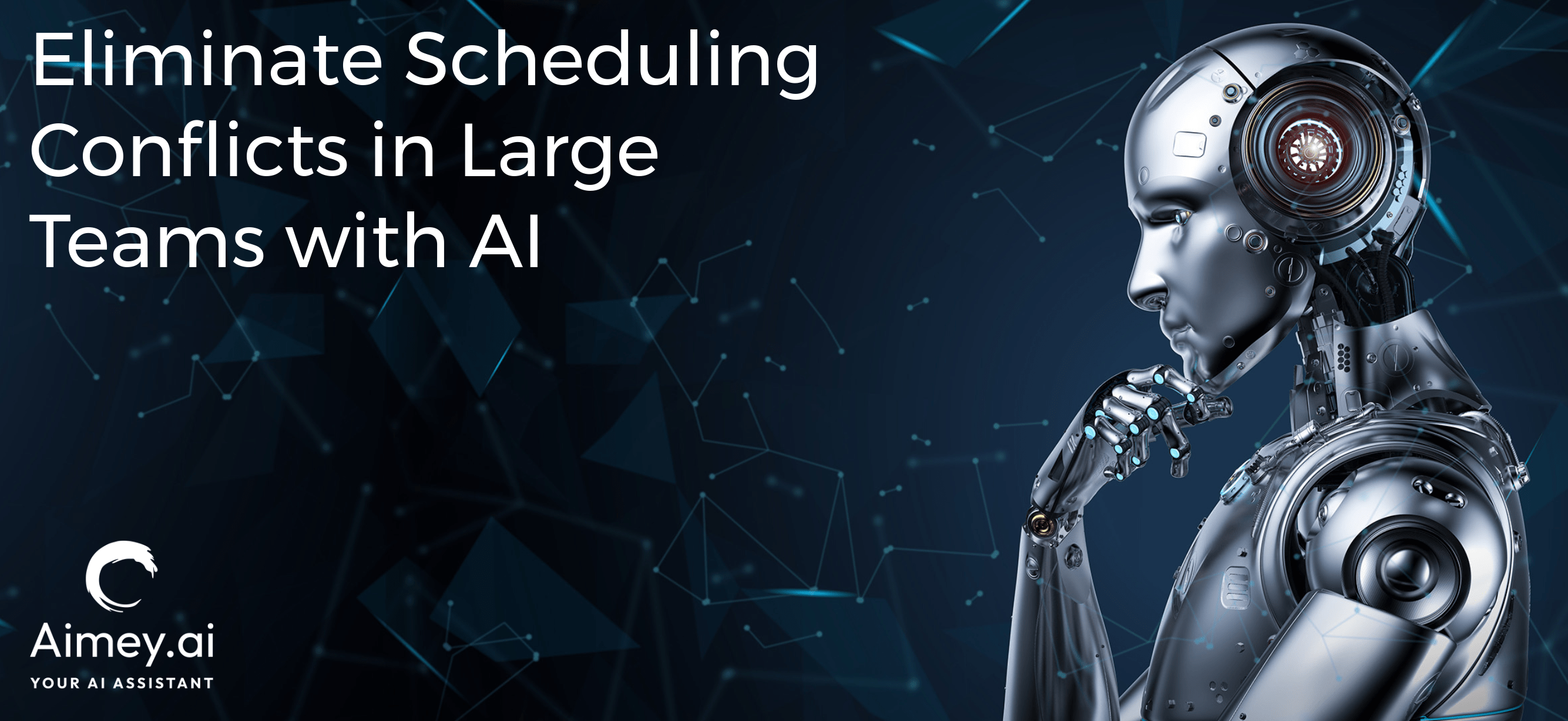Defining the Issue: Scheduling Conflicts in Large Teams
In today’s fast-paced work environment, managing team schedules efficiently is essential for maintaining productivity. However, scheduling conflicts often arise, particularly within large teams. These conflicts can have significant repercussions on timelines, resource allocation, and overall team morale. Aimey.ai steps in as a robust solution, offering advanced tools that eliminate scheduling conflicts in large teams, thereby streamlining operations and enhancing productivity.
The Impact: How Scheduling Conflicts Can Hinder Productivity and Efficiency
Scheduling conflicts can be a major roadblock to team efficiency. When team members are unable to align their schedules, critical tasks may be delayed, meetings might be postponed, and deadlines can be missed. This misalignment not only hampers individual productivity but also disrupts the overall workflow within the team. Additionally, frequent scheduling conflicts can lead to frustration and diminished morale among team members. Identifying and addressing the root causes of these conflicts is crucial for any organization seeking to maintain a seamless and productive work environment.
A Possible Solution: The Role of AI in Managing Team Schedules
Artificial Intelligence (AI) offers a compelling solution to the persistent issue of scheduling conflicts. AI-powered scheduling assistants like Aimey.ai are designed to analyze and manage complex team schedules with precision, reducing the likelihood of conflicts. AI can take into account various factors such as availability, time zones, workload, and priority tasks. By doing so, it ensures that the scheduling process is not only efficient but also fair and inclusive, thereby fostering a collaborative and positive work atmosphere.
Unpacking the Tool: How AI-Powered Assistants Can Help Teams Tackle Scheduling Conflicts
When coordinating a large team, managing schedules is often a challenging task. Fortunately, AI-powered assistants can significantly alleviate these difficulties. Utilizing advanced algorithms and machine learning, AI tools can analyze vast amounts of data to find the most optimal meeting times. This approach not only saves time but also eliminates many of the human errors commonly associated with manual scheduling.
Real-Life Applications: Case Studies on AI Successfully Eliminating Scheduling Conflicts in Large Teams
Various organizations have already embraced AI to solve their scheduling dilemmas. Take, for instance, a multinational tech company that struggled to align meeting times across different geographical locations. Upon integrating AI-powered scheduling tools, the company observed a 30% increase in meeting efficiency and a significant reduction in time spent on coordination. Another example involves an educational institution that deployed AI to coordinate faculty meetings, resulting in more streamlined operations and higher staff satisfaction.
A Look at Aimey.ai: Leveraging Cutting-Edge AI to Resolve Team Scheduling Issues
Aimey.ai is at the forefront of using AI to resolve scheduling conflicts in large teams. The platform leverages proprietary algorithms to consider multiple factors such as time zones, individual calendars, and meeting priorities. By doing so, Aimey.ai ensures that everyone is accounted for, maximizing both attendance and productivity.
- Advanced Algorithms: Aimey.ai uses sophisticated algorithms to synchronize calendars and schedules in real-time.
- Time Zone Management: The platform automatically adjusts meeting times based on different time zones.
- Priority Scheduling: Important meetings are prioritized to ensure key stakeholders are always available when needed.
- User-Friendly Interface: Easy-to-use interface that requires minimal training and effort from the team members.
- Real-Time Adjustments: Aimey.ai can make on-the-fly adjustments to schedules with minimal disruptions.
Did you know? AI-powered scheduling tools like Aimey.ai can reduce the time spent on coordinating team meetings by up to 80%, enhancing overall productivity.
Reflections on AI’s Role in Team Management and Productivity
Over the past few decades, technology has revolutionized the way teams operate and communicate. The integration of AI into team management introduces an unprecedented level of efficiency and precision. AI-powered tools, such as those offered by Aimey.ai, redefine the landscape by minimizing the challenges faced in coordinating schedules. This, in turn, eliminates scheduling conflicts in large teams, paving the way for a more seamless, cohesive workflow.
Future Prospects: How AI Could Shape Team Scheduling and Coordination in the Future
The future potential for AI in team scheduling is vast. As AI continues to evolve, we can anticipate even more sophisticated algorithms that can predict scheduling conflicts before they arise, analyze patterns in team availability, and offer real-time adjustments. Innovations like automated meeting rescheduling, conflict resolution, and predictive analytics will not only streamline current processes but also enable teams to focus on strategy and execution. The proactive capabilities of AI in addressing these hurdles highlight the importance of integrating advanced technologies into our day-to-day operations. To get a detailed overview of our system, explore how it works.
Final Thoughts: Eliminating Scheduling Conflicts in Large Teams with AI Integration
The importance of a well-coordinated schedule cannot be overstated, especially in sizable teams where coordination complexities can escalate quickly. The AI innovations introduced by Aimey.ai provide concrete solutions to these challenges. With the ability to minimize downtime, realign priorities, and ensure that each team member is operating at peak efficiency, AI-driven tools prove to be a game-changer. As we continue to advance these technologies, we remain committed to enhancing team productivity and eliminating scheduling conflicts in large teams. The path ahead is promising, and with AI at our helm, the possibilities for optimizing team coordination are truly limitless.
FAQ
What specific scheduling conflicts can AI tools like Aimey.ai address in large teams?
In large teams, AI tools such as Aimey.ai are adept at tackling various scheduling conflicts, including overlapping meetings, double-booked resources, and unbalanced workloads. Our AI can identify potential overlaps and recommend alternatives that suit all involved parties, ensuring everyone can attend necessary meetings without sacrificing other commitments. Additionally, it allocates resources efficiently to prevent double-booking and balances workloads by distributing tasks in alignment with team members’ availability.
How does Aimey.ai integrate with current team management platforms, and what is the process?
Our AI-powered tool, Aimey.ai, seamlessly integrates with popular team management platforms such as Slack, Microsoft Teams, and Google Workspace. The process involves connecting Aimey.ai to your existing platform using our easy-to-follow setup guide. Once connected, the AI begins to learn your team’s schedules and preferences. Subsequently, it starts providing intelligent scheduling solutions directly through the platform, becoming more refined over time as it adapts to your team’s specific needs.
Can AI really predict and prevent scheduling conflicts before they happen?
Absolutely. AI has the remarkable ability to analyze historical data and identify patterns in team schedules, which enables it to forecast potential conflicts. Consequently, our AI can suggest proactive solutions and make adjustments to avoid these conflicts entirely. For instance, Aimey.ai can alert team members about a possible clash in schedules and propose alternative timings before the conflict becomes a real issue, thus maintaining a smooth workflow.
What are the benefits of using Aimey.ai over traditional scheduling methods?
Using Aimey.ai over conventional scheduling methods brings numerous benefits to the table. Firstly, it greatly reduces the time spent in managing schedules, as AI instantly processes requests and updates. In addition, Aimey.ai provides data-driven insights that help in making informed decisions about resource allocation and workload distribution. Furthermore, our AI promotes transparency and keeps all team members in the loop with real-time updates, which fosters a collaborative environment. Lastly, the precision of AI in organizing schedules ensures that the risk of human error is minimized, leading to increased productivity and efficiency.
Looking forward, how might AI change the way large teams coordinate schedules in the future?
Looking to the future, AI is poised to further revolutionize the way large teams coordinate their schedules. With advancements in machine learning and predictive analytics, AI will not only react to scheduling conflicts but also anticipate them well in advance. We might see the development of features that suggest optimal meeting times based on participants’ work habits, or even AI that can negotiate scheduling changes autonomously. This progression will likely lead to more dynamic and adaptable scheduling systems, enabling teams to focus on delivering their best work while AI handles the intricacies of coordination.

